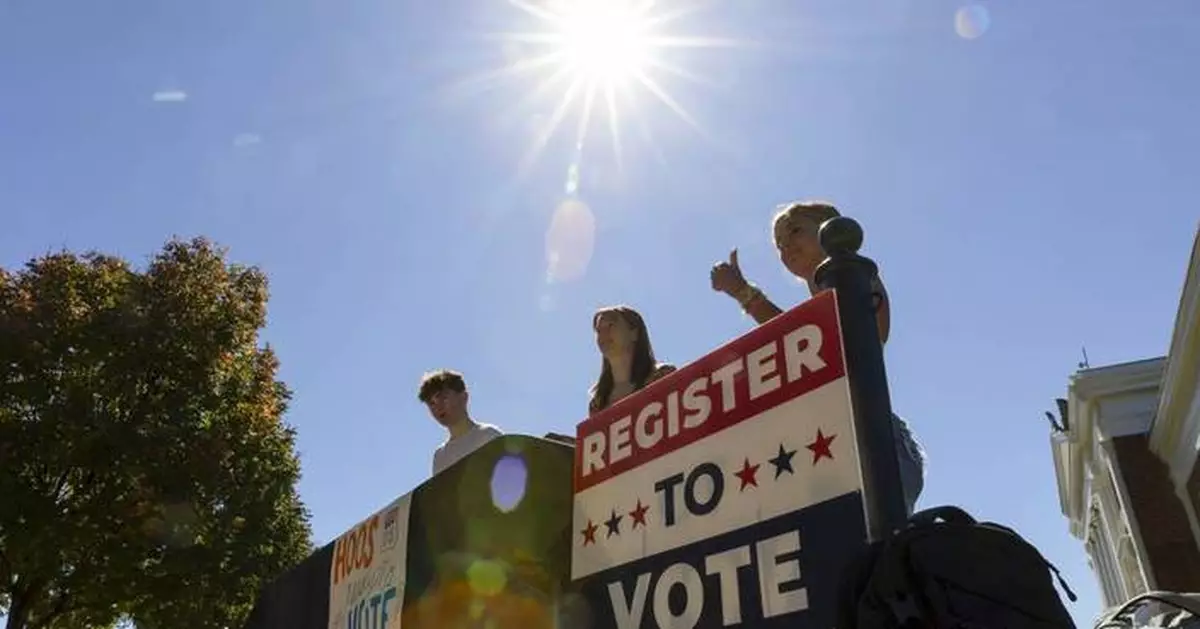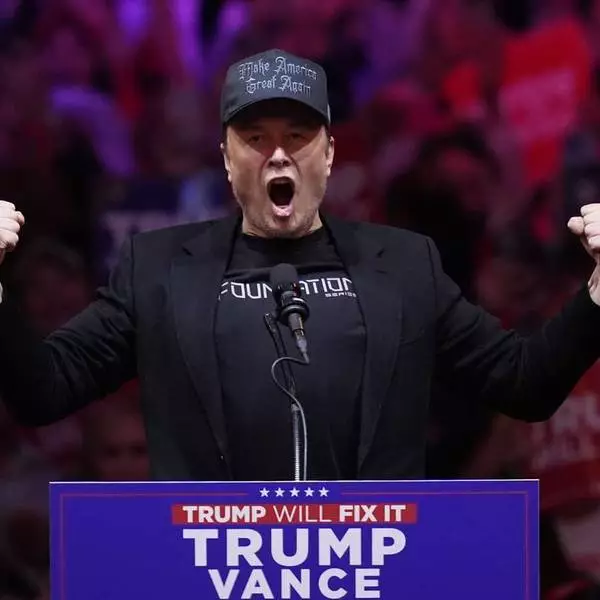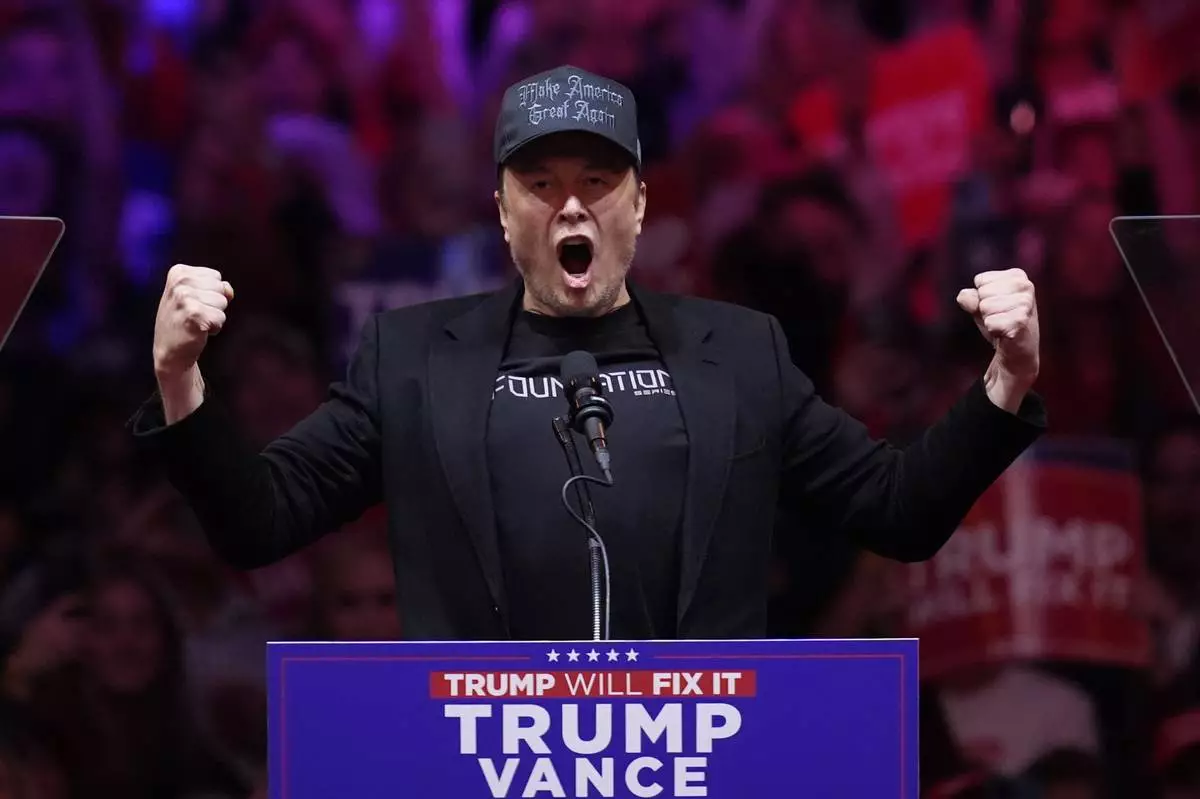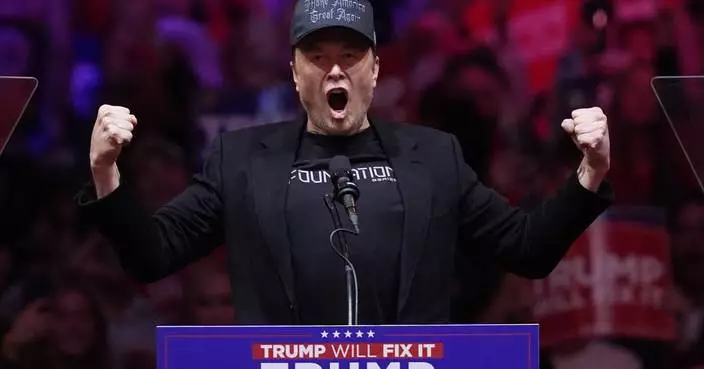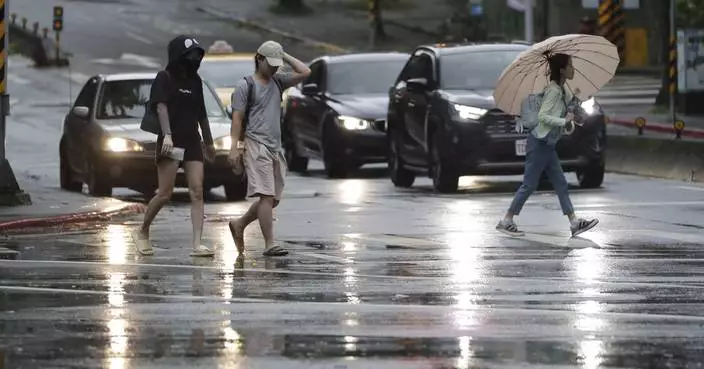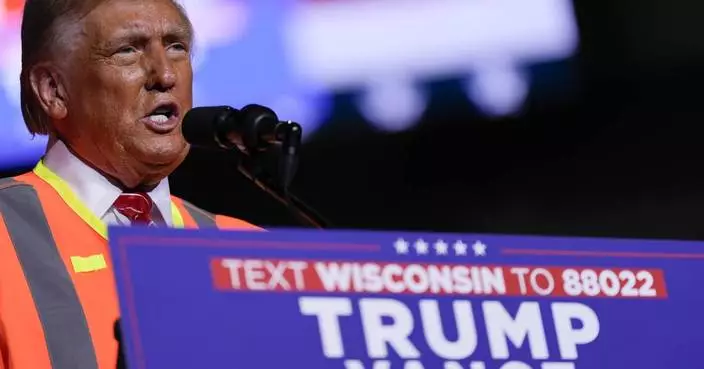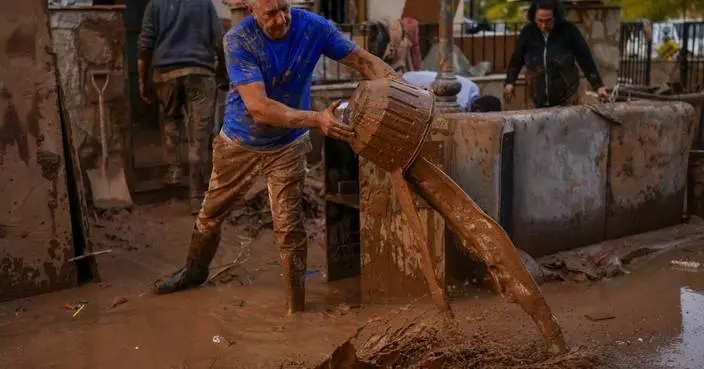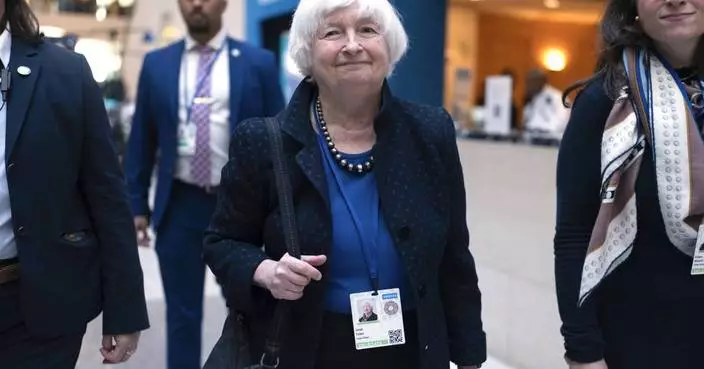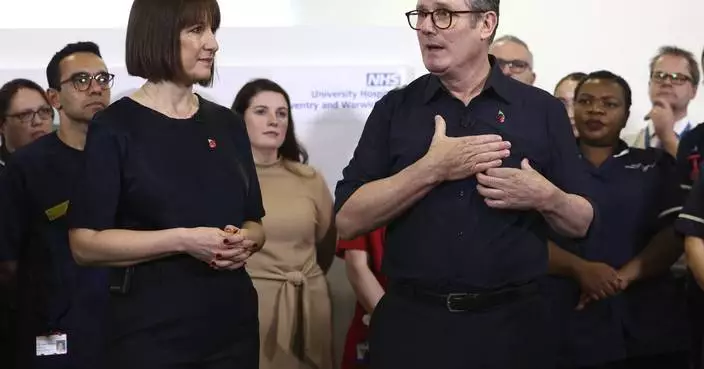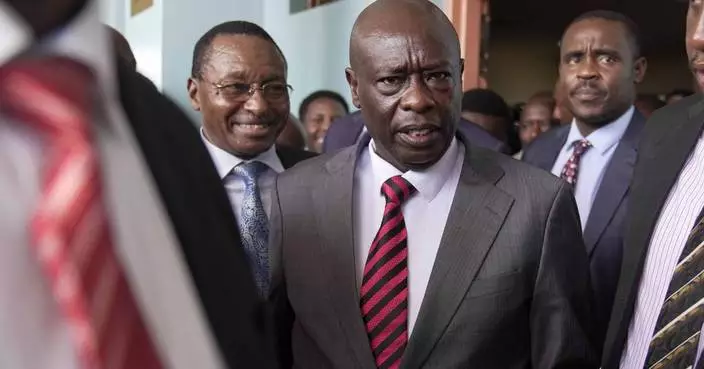CHARLOTTESVILLE, Va. (AP) — Few elections in the nation’s history have provided such a divide as this year's, with the two major candidates and so many of their supporters saying the outcome will determine the fate of the country and whether it can hold to its democratic moorings.
As they cast their ballots, voters have opinions on the divide as diverse and complex as the nation itself. Perhaps no place captures this range of perspective more clearly than Charlottesville, Virginia.
It was once a meeting place for Founding Fathers who cautioned about the dangers of political demagoguery. It also was the site of the “Unite the Right” rally in 2017, the first year of Donald Trump’s presidency, when hundreds of white nationalists and neo-Nazis felt emboldened enough to unleash racist and antisemitic violence on the community for its decision to remove a Confederate statue. They chanted “Jews will not replace us” as they marched through the streets carrying tiki torches and Confederate flags.
One rallygoer plowed his car into a crowd of counter-protesters, killing a woman and injuring dozens more. President Joe Biden has said the open display of racism and antisemitism prompted him to enter the race for the White House in 2020.
Associated Press journalists spent three days in and around Charlottesville during early October, interviewing voters about the election that is now days away. These voters have experienced one of the most visible recent examples of the vitriol and division that has long been brewing beneath the country’s surface, a reminder of what can happen when hate erupts and extreme ideas are allowed to fester unchecked.
Here is what they had to say about the presidential election and its consequences.
As a racial justice activist in the summer of 2017, Jalane Schmidt tried to sound the alarm early.
The religious studies professor at the University of Virginia said as she was helping Charlottesville residents prepare for “Unite the Right” and the other racist demonstrations that preceded it, she was too often told to “just have a dialogue and not be so polarizing or dismissive.”
“I was like, how am I supposed to have a dialogue with someone who desires my annihilation?” said Schmidt, who is Black.
Looking back on that summer, Schmidt says she and other activists saw then what others have started to see since — that extremists pose a real danger that is not going away.
Schmidt said Trump’s return to the White House poses a threat to democracy, one the Founding Fathers warned about.
“I think we have things to learn from some of the warnings that have been given to us about demagogues,” she said. “It is not an overstatement to say that democracy is on the line with this election.”
Rob Pochek, the senior pastor, gathered a small group of men in a meeting room at First Baptist Church on Park Street, a Charlottesville institution approaching its 200th anniversary.
Universally, they denounced the “Unite the Right” rally as hateful and against their values. Pochek said the marchers’ antisemitic comments came “straight from the pits of hell.” Christians worship Jesus, who was a Jew, he said.
While the group had nuanced views about Trump, they all agreed they cannot support Vice President Kamala Harris because of her stance on abortion. Pochek said Trump’s lies, specifically about the 2020 election, and other rhetoric make it a tough decision.
“I think the fact that we have former President Trump and Vice President Harris as the two candidates for president of the United States is in itself a judgment on America, that this is the best we have out of nearly 400 million Americans,” he said.
He also tries to build bridges, emphasizing to his congregants that people with different points of view should not be seen as their enemies.
Referring to the symbols of both major parties, Pochek tells them their allegiance is not to a donkey or an elephant: “We worship the Lamb,” he said.
Susan Bro lives in a single-wide trailer in Ruckersville, about a half-hour’s drive outside Charlottesville, a town so small it sometimes doesn’t appear on maps.
The car that struck the “Unite the Right” counter-protesters killed her daughter, 32-year-old Heather Heyer. Bro said that summer awakened her and other white residents to the hatred people of color had long known.
“I think the blinders are off,” she said. “This existed. We just pretended it didn’t.”
She said she's terrified of what will happen to the country if Trump wins. She’s concerned about his lies, his promises of retribution and the Republican Party’s failure to stand up to him. She’s not sure whether democracy can survive.
But she also realized that events like what happened in Charlottesville seven years ago can delude people into thinking that hate is exclusive to extremists.
“We all have to watch ourselves with these virulent rhetoric paths that we go down, because once you start on that, it’s really easy to just keep mouthing these phrases, holding on to these ideas,” Bro said. “We have more in common than we think we do.”
At an early voting office in Charlottesville, Dan and Ruth Suggs said they had cast their ballots for Trump. The couple, married for 53 years, did not see Trump or Harris as an existential threat to the nation’s future.
“It’s not the end of the world. No matter who wins, it is still pretty much going to be the same thing,” said Dan Suggs. “The biggest difference is going to be the economy.”
They both disagreed with how the city handled the removal of the statue of Confederate Gen. Robert E. Lee from a downtown park, a decision that sparked the 2017 rally. They said the city should have held a referendum on the issue and that it mismanaged the protest.
“I believe in free speech. I don’t think anybody has the right to try to shut it down, and that’s basically what they were trying to do to the alt-right,” Dan Suggs said.
Ruth Suggs said not everyone present was there to cause trouble.
“There were people who just wanted to hear what they had to say,” she said. “Trump was right when he said there were good people on both sides.”
Nineteen-year-old Kushaan Soodan's parents are Indian immigrants. Eighteen-year-old Arturo Romero is from Mexico and legally immigrated to California in high school with his parents and younger sisters.
The two are now college students and acquaintances at the University of Virginia. But they see the election completely differently, in part because of their experiences hailing from immigrant families.
As Soodan registered UVA students to vote on a recent Friday, he said the election is crucial to preserving democracy and making a statement that hate should not have a home in America.
“That sort of hatred — we’ve already seen what that can cause," said Soodan, standing near the campus walkway used seven years ago by the “Unite the Right” marchers. “And I think that this election is one of the ways we can do that to where we can say, no, we don’t want this, we don’t like this.”
Romero said he feared a Harris victory would push the country to the point of no return. He defended Trump and said his words were often misunderstood, including when he suggested that migrants who are in the U.S. and have committed murder did so because “it’s in their genes.”
Romero said Trump was not speaking about all immigrants. He said he had seen how Mexico changed for the worse when more migrants began traveling through to get to the U.S. He said crime increased, and he doesn't want the same thing to happen to America.
Romero praised Trump’s overall impact on the economy, border and the nation’s international stability, and he felt Biden’s policies had fallen short: “If we get four more years, then this is not going to be reversible.”
Leslie Scott-Jones was born and raised in Charlottesville and has lived her life aware of the worst consequences of racism. So she was perplexed after the “Unite the Right” rally to see the news media present it as shocking.
“How did you come to believe that we were living in a post-racial society?” said Scott-Jones, who is Black. “Because the rest of us have been living a very different experience.”
The violent rally was a “bubble bursting,” she said, but “the pot’s still on the stove.”
Still, it was a deeply painful moment for Scott-Jones, who was holding an event for artists when she heard crashing sounds that turned out to be the vehicle assault on the counter-protesters. She stopped what she was doing and rushed to help.
Scott-Jones, who is curator of learning and engagement at a local African American heritage center, said she has heard the pleas to save democracy with her vote, but they don’t seem compelling. She thinks the system needs to be reimagined.
“This country has not worked for Black people since we got here,” she said. “Why would I want to save something that literally treated my people as property for hundreds of years?”
She said she is voting for third-party candidate Cornel West and hopes America can someday live up to the ideals it espouses.
Might the country descend into political violence and sink into deeper division after November’s election?
“That is a worry,” Scott-Jones said. “But I honestly don’t think that that depends on who sits in that chair.”
Associated Press researcher Rhonda Shafner in New York contributed to this report.
The Associated Press receives support from several private foundations to enhance its explanatory coverage of elections and democracy. See more about AP’s democracy initiative here. The AP is solely responsible for all content.
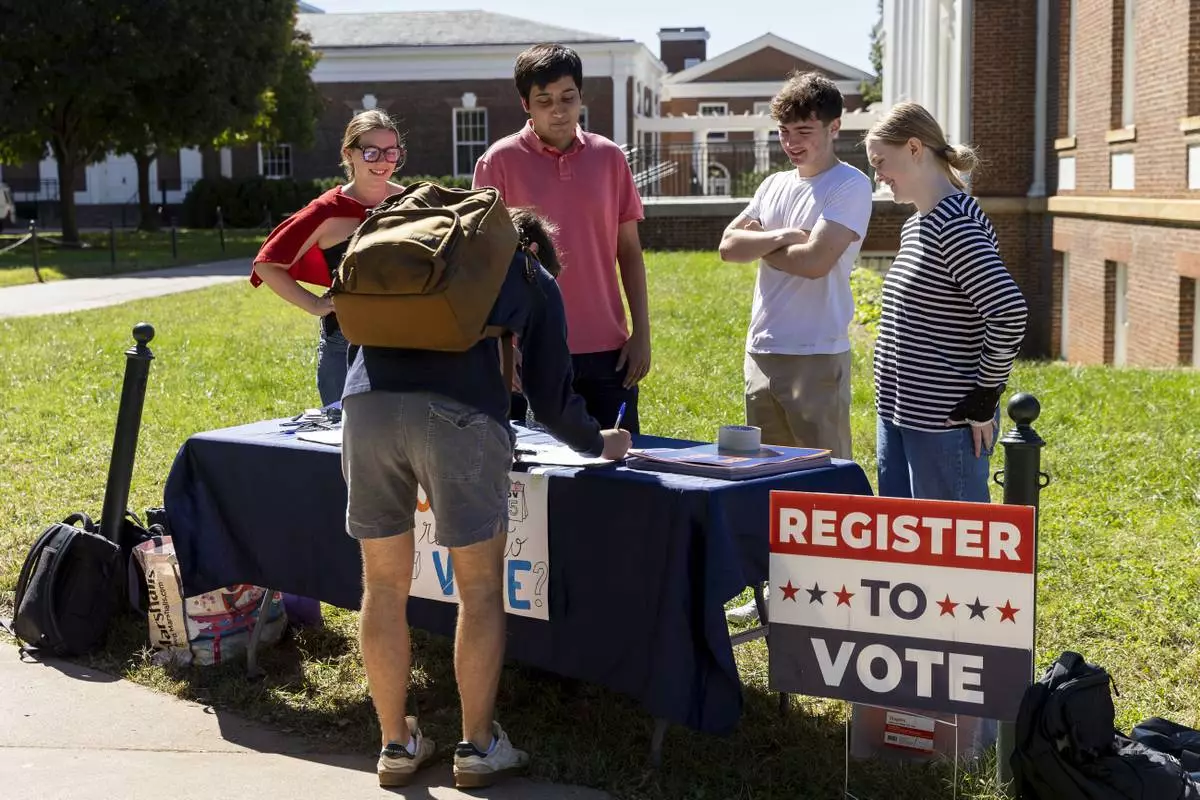
Eleanor Clemons, Kushaan Soodan, James Galvin and Cate Love register students to vote at the University of Virginia in Charlottesville, Va., Friday, Oct. 11, 2024. (AP Photo/Ryan M. Kelly)
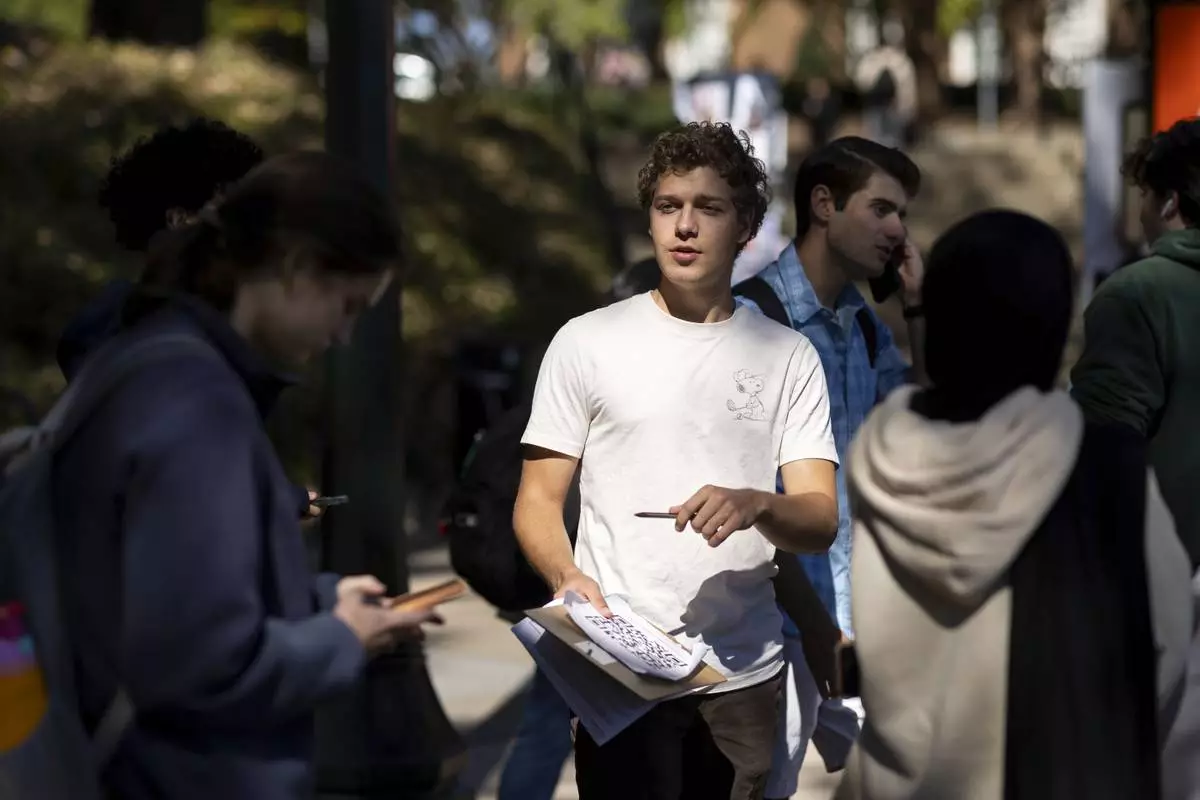
Will Pinto polls students on their voter registration status at the University of Virginia in Charlottesville, Va., Friday, Oct. 11, 2024. (AP Photo/Ryan M. Kelly)
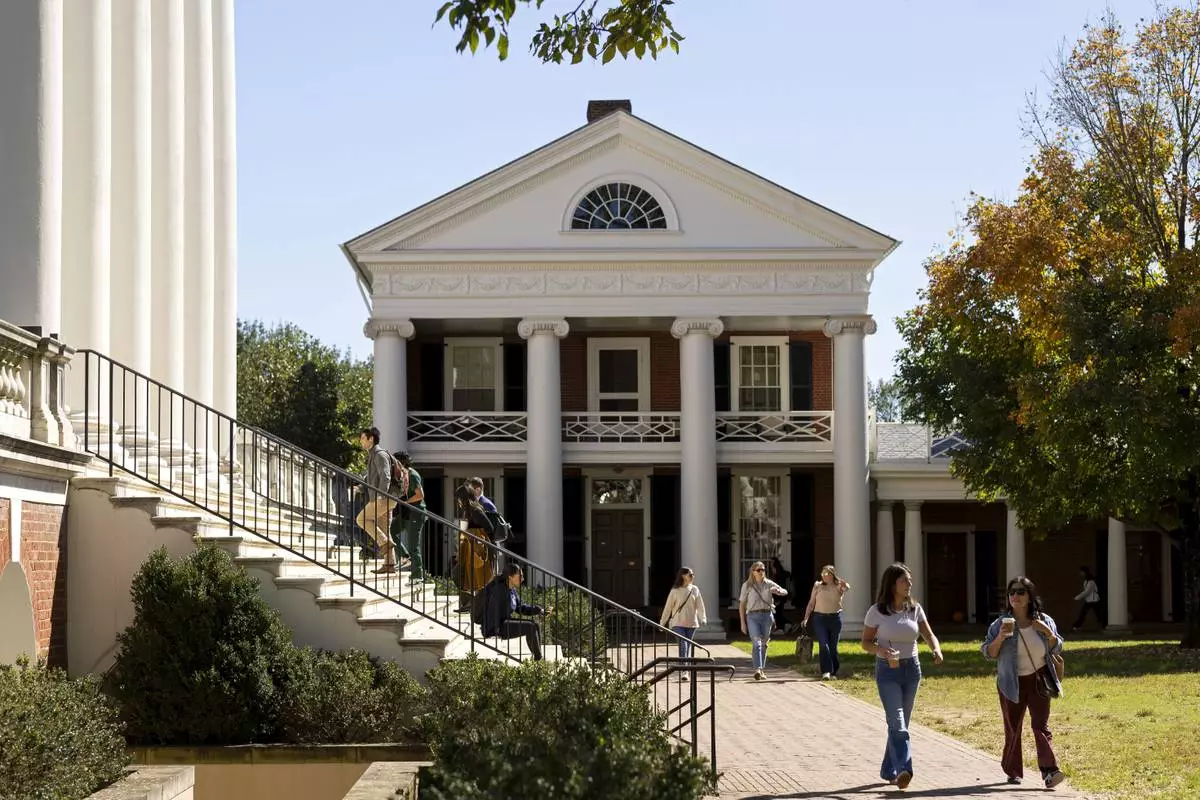
People climb steps to the Rotunda at the University of Virginia in Charlottesville, Va., Friday, Oct. 11, 2024. (AP Photo/Ryan M. Kelly)
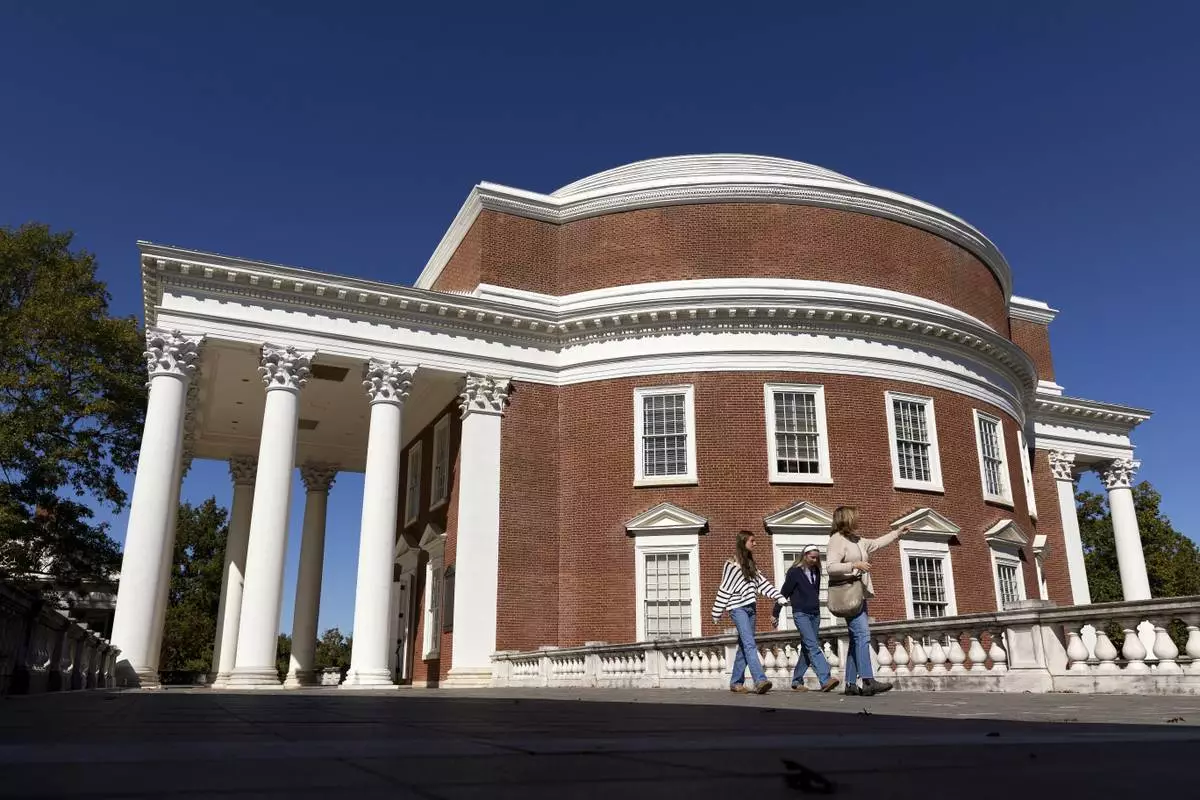
People walk past the Rotunda at the University of Virginia in Charlottesville, Va., Friday, Oct. 11, 2024. (AP Photo/Ryan M. Kelly)
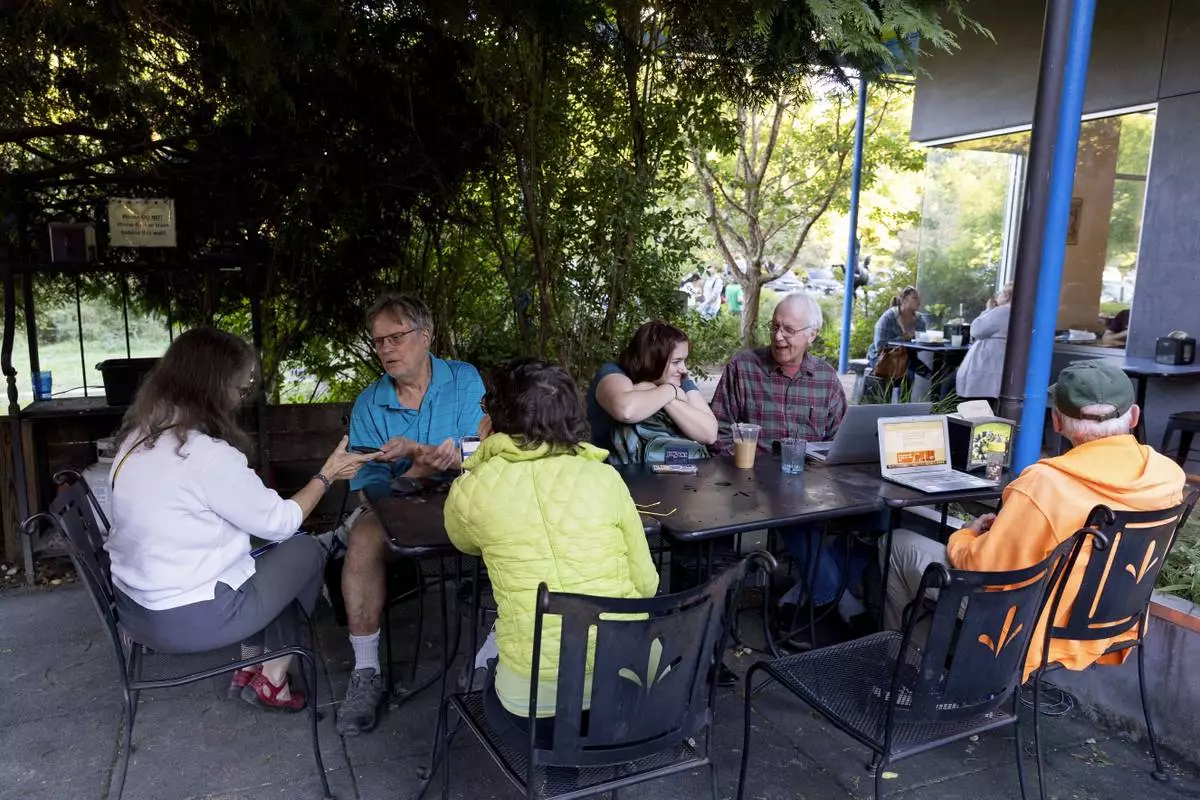
Patricia Sepulveda, Keith Fieldhammer, Frances Summers and Mark Harris send texts at IX Art Park in Charlottesville, Va., Thursday, Oct. 10, 2024. Charlottesville Democrats meet weekly to make phone calls, write postcards and send texts to get out the vote. (AP Photo/Ryan M. Kelly)
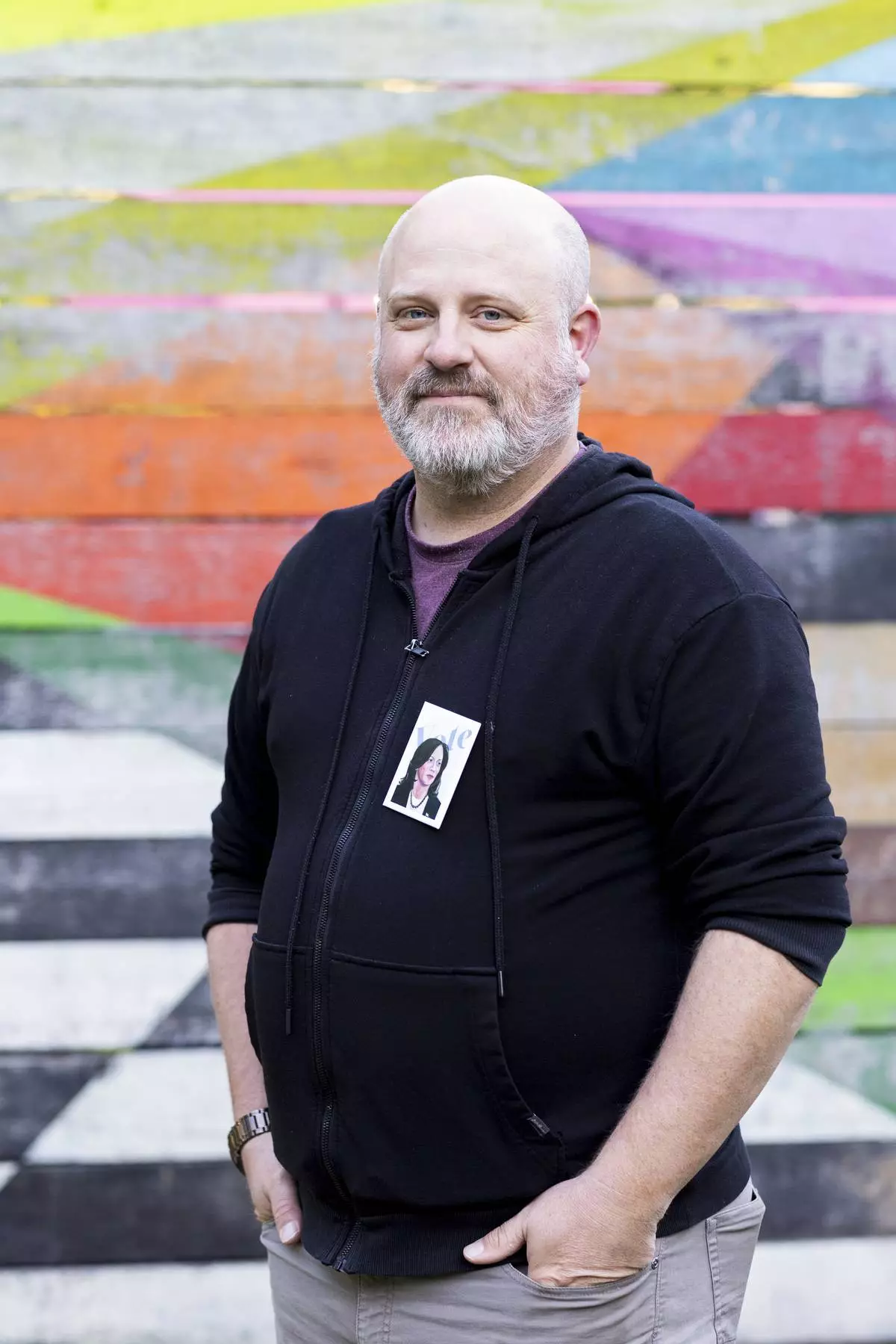
Josh Throneburg stands for a portrait at IX Art Park in Charlottesville, Va., Thursday, Oct. 10, 2024. Charlottesville Democrats meet weekly to make phone calls, write postcards and send texts to get out the vote. (AP Photo/Ryan M. Kelly)
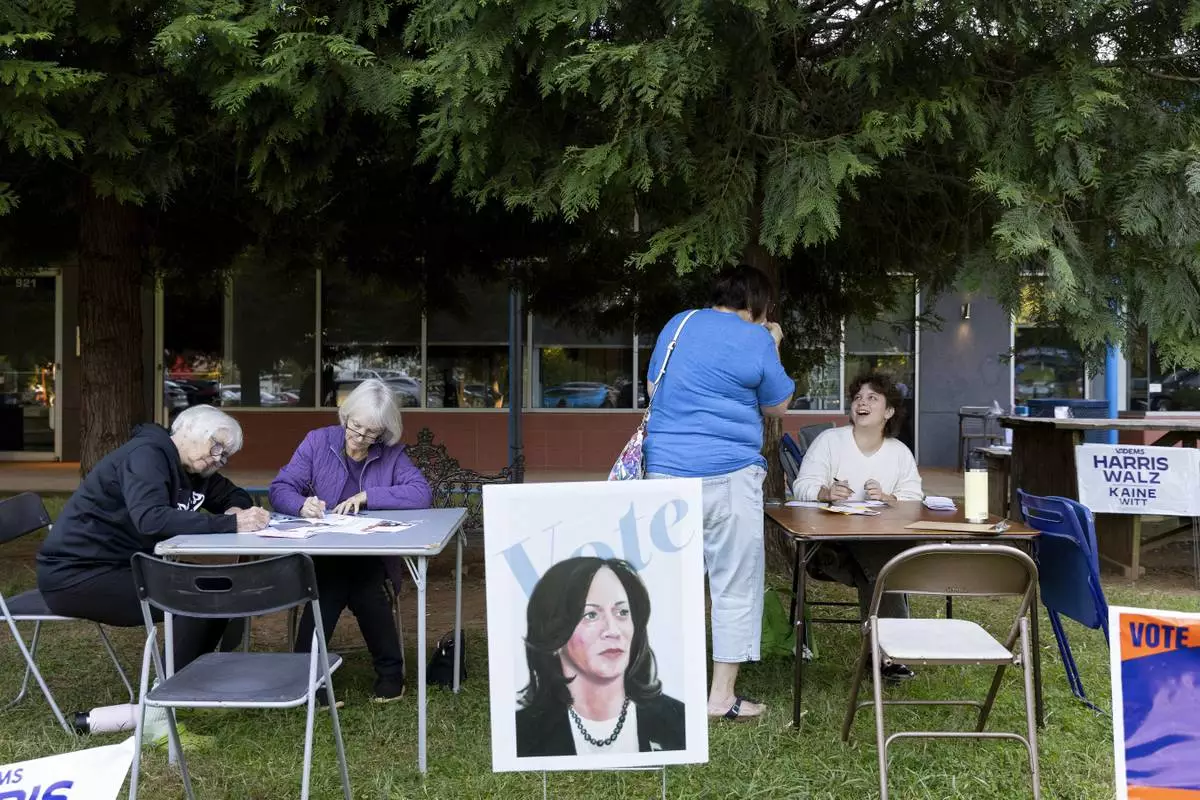
Ellen Shrum, Jeanette Rosenberg, Nancy Gulotta and Cannon Slayton write postcards at IX Art Park in Charlottesville, Va., Thursday, Oct. 10, 2024. Charlottesville Democrats meet weekly to make phone calls, write postcards and send texts to get out the vote. (AP Photo/Ryan M. Kelly)
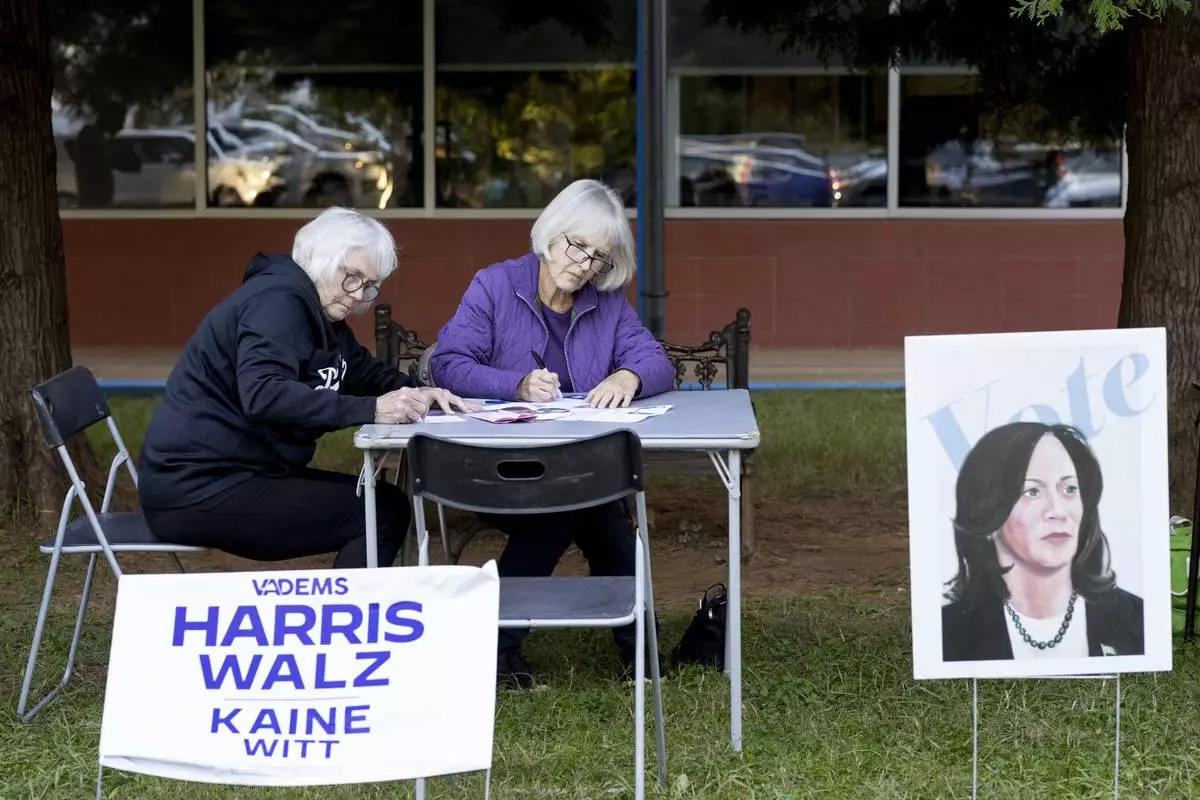
Ellen Shrum and Jeanette Rosenberg write postcards at IX Art Park in Charlottesville, Va., Thursday, Oct. 10, 2024. Charlottesville Democrats meet weekly to make phone calls, write postcards and send texts to get out the vote. (AP Photo/Ryan M. Kelly)
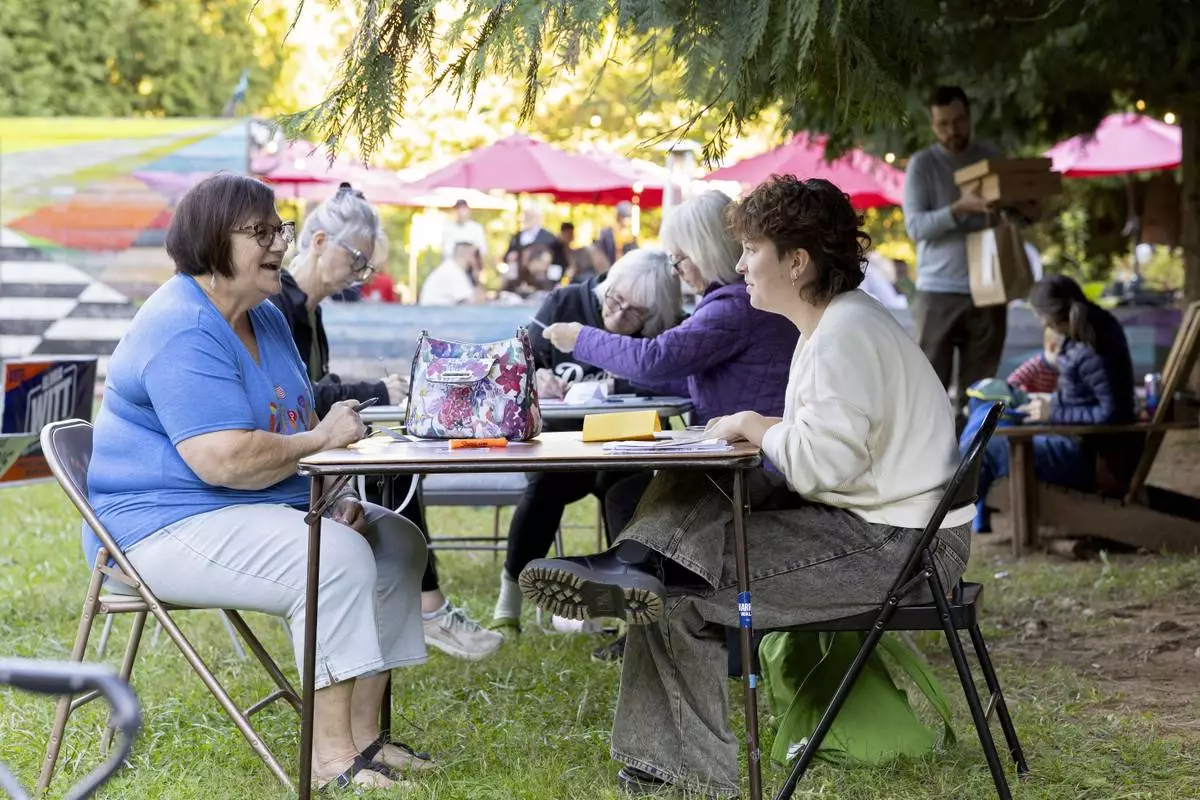
Nancy Gulotta and Cannon Slayton write postcards at IX Art Park in Charlottesville, Va., Thursday, Oct. 10, 2024. Charlottesville Democrats meet weekly to make phone calls, write postcards and send texts to get out the vote. (AP Photo/Ryan M. Kelly)
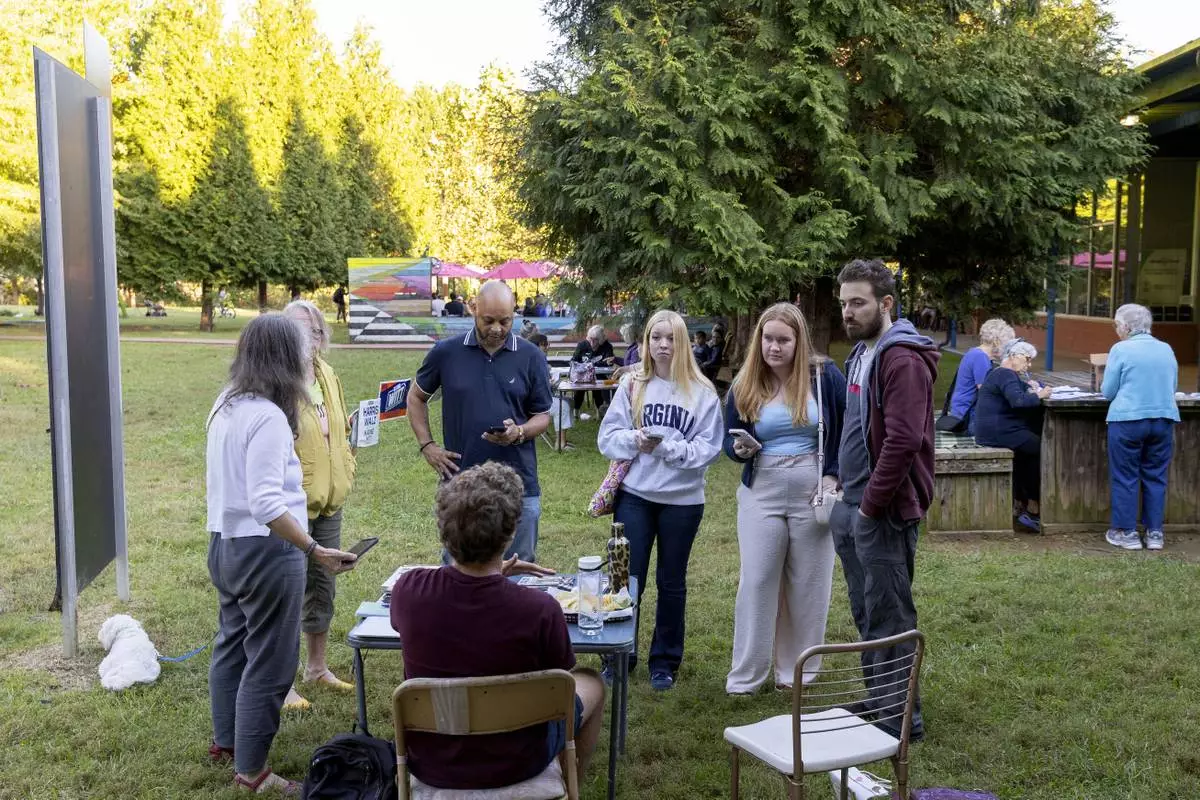
Volunteers receive canvassing instructions at IX Art Park in Charlottesville, Va., Thursday, Oct. 10, 2024. Charlottesville Democrats meet weekly to make phone calls, write postcards and send texts to get out the vote. (AP Photo/Ryan M. Kelly)
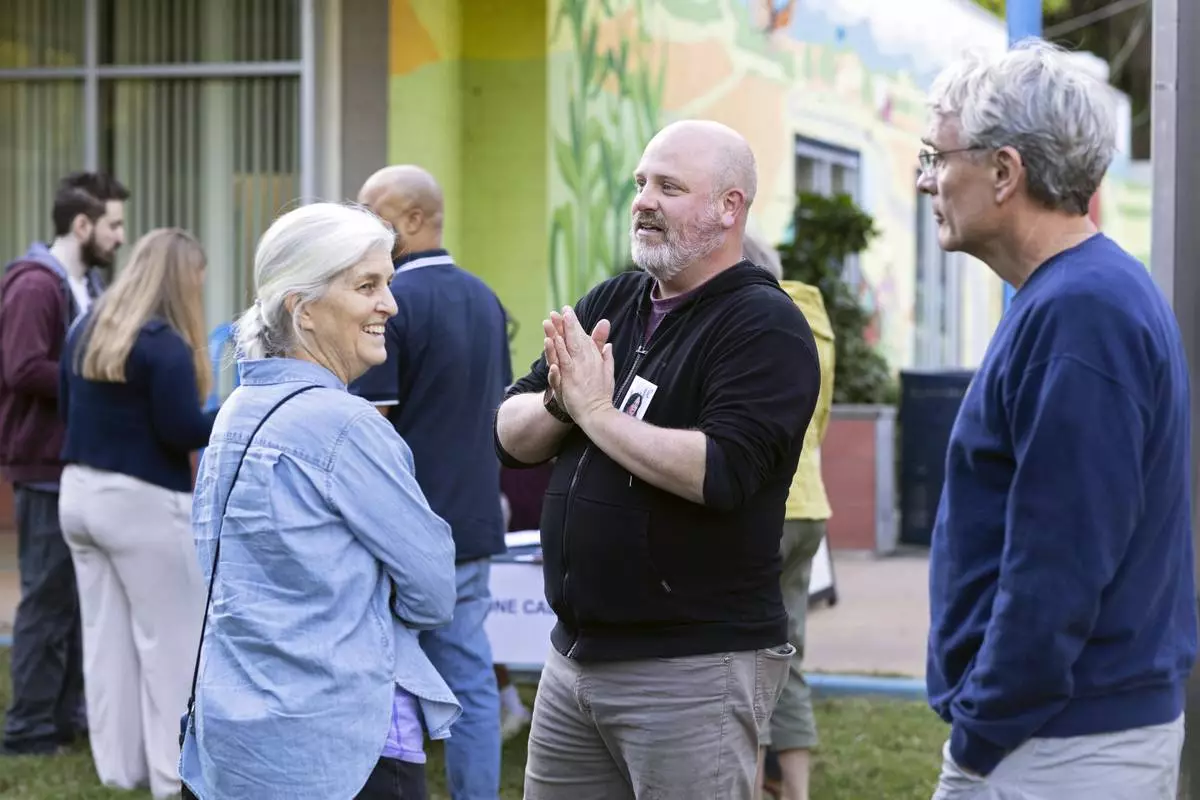
Josh Throneburg greets volunteers at IX Art Park in Charlottesville, Va., Thursday, Oct. 10, 2024. Charlottesville Democrats meet weekly to make phone calls, write postcards and send texts to get out the vote. (AP Photo/Ryan M. Kelly)
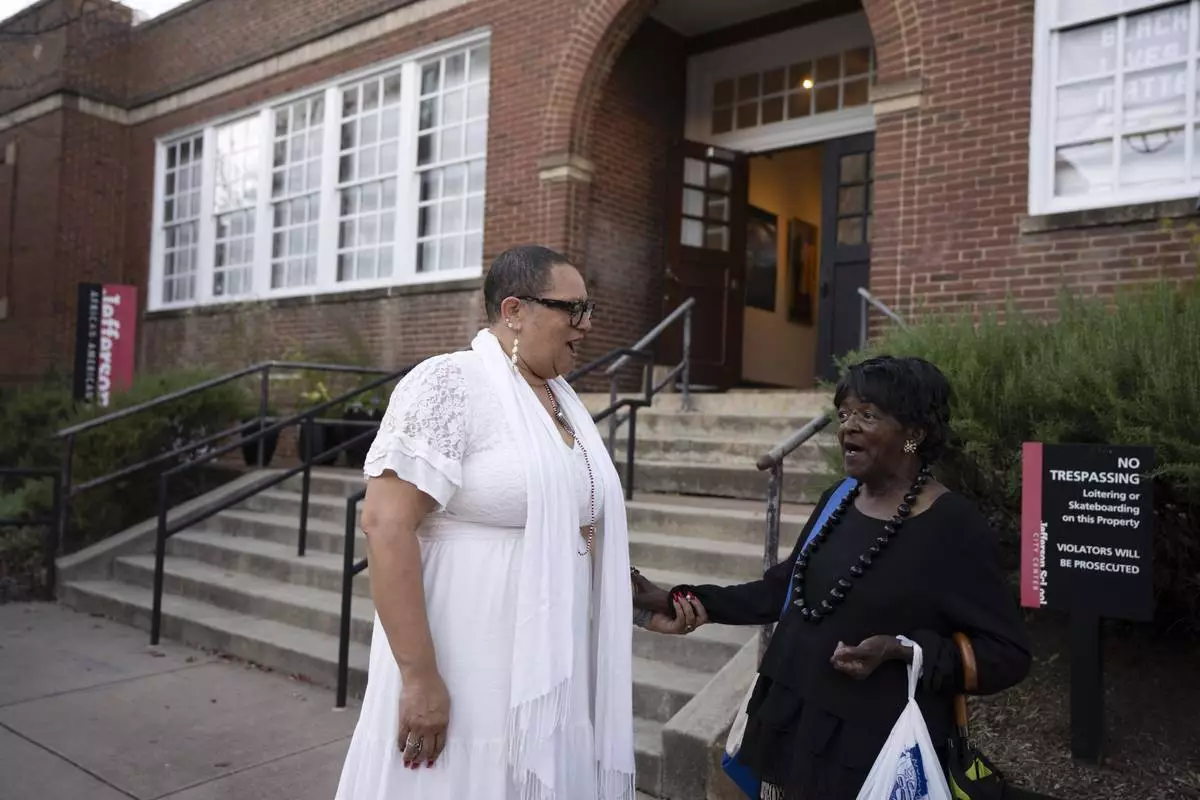
Leslie M. Scott-Jones, left, curator of learning and engagement at the Jefferson School African American Heritage Center, chats with Mattie Louis Spriggs, a close friend, Oct. 10, 2024, in Charlottesville, Va. (AP Photo/Serkan Gurbuz)
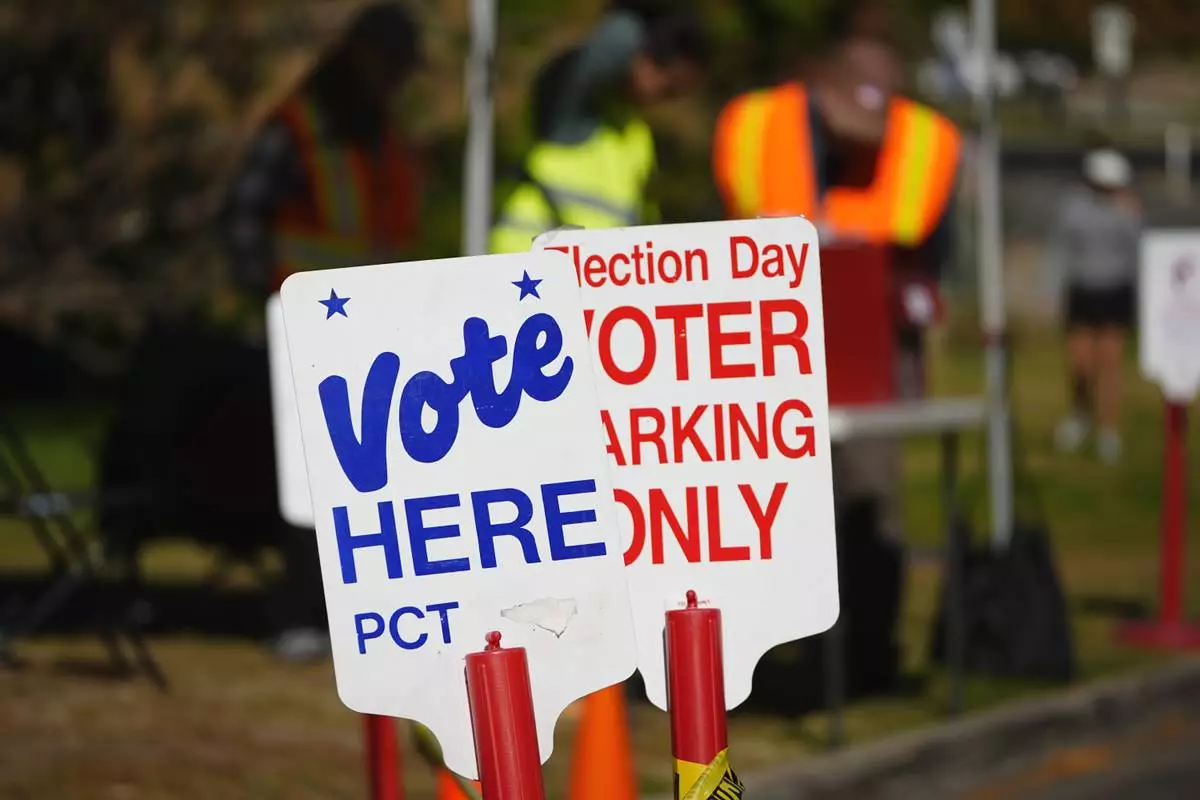
Signs direct voters to a ballot drop-off location Oct. 25, 2024, in Washington Park in Denver. (AP Photo/David Zalubowski)
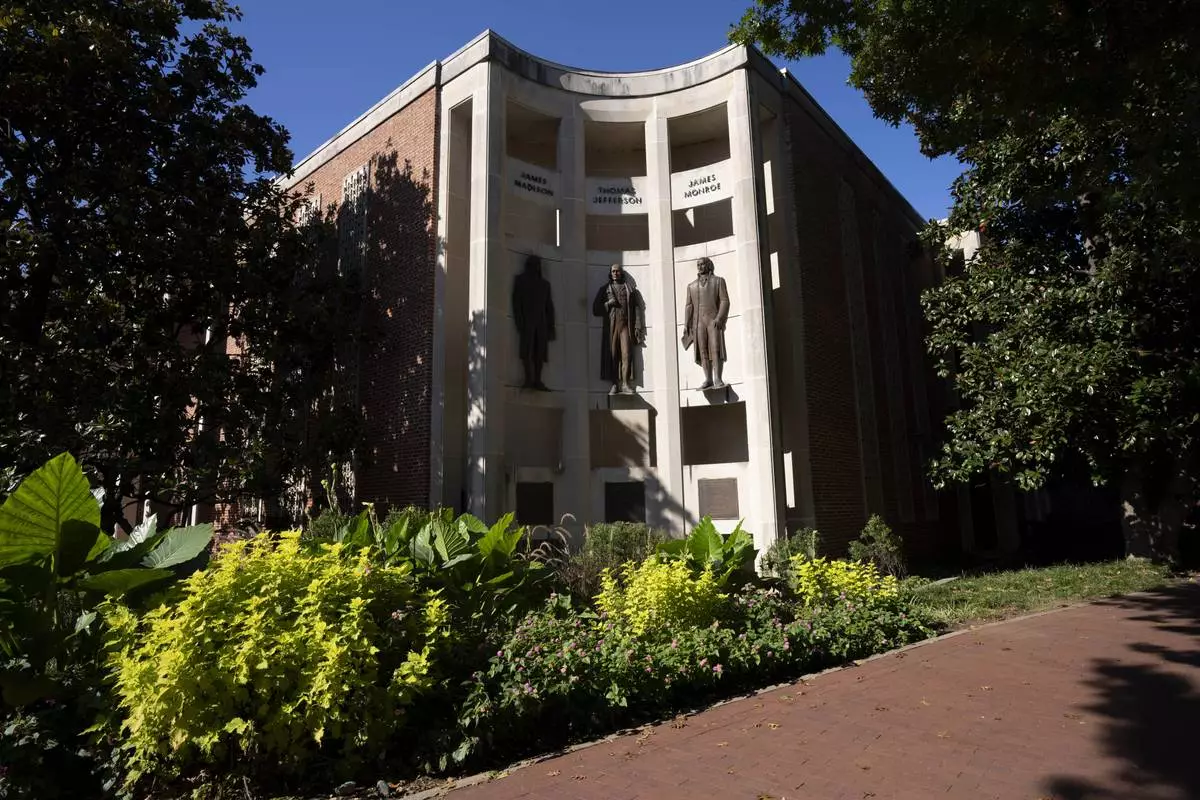
Statues of James Madison, Thomas Jefferson and James Monroe are seen at the city hall Oct. 10, 2024, in Charlottesville, Va. (AP Photo/Serkan Gurbuz)
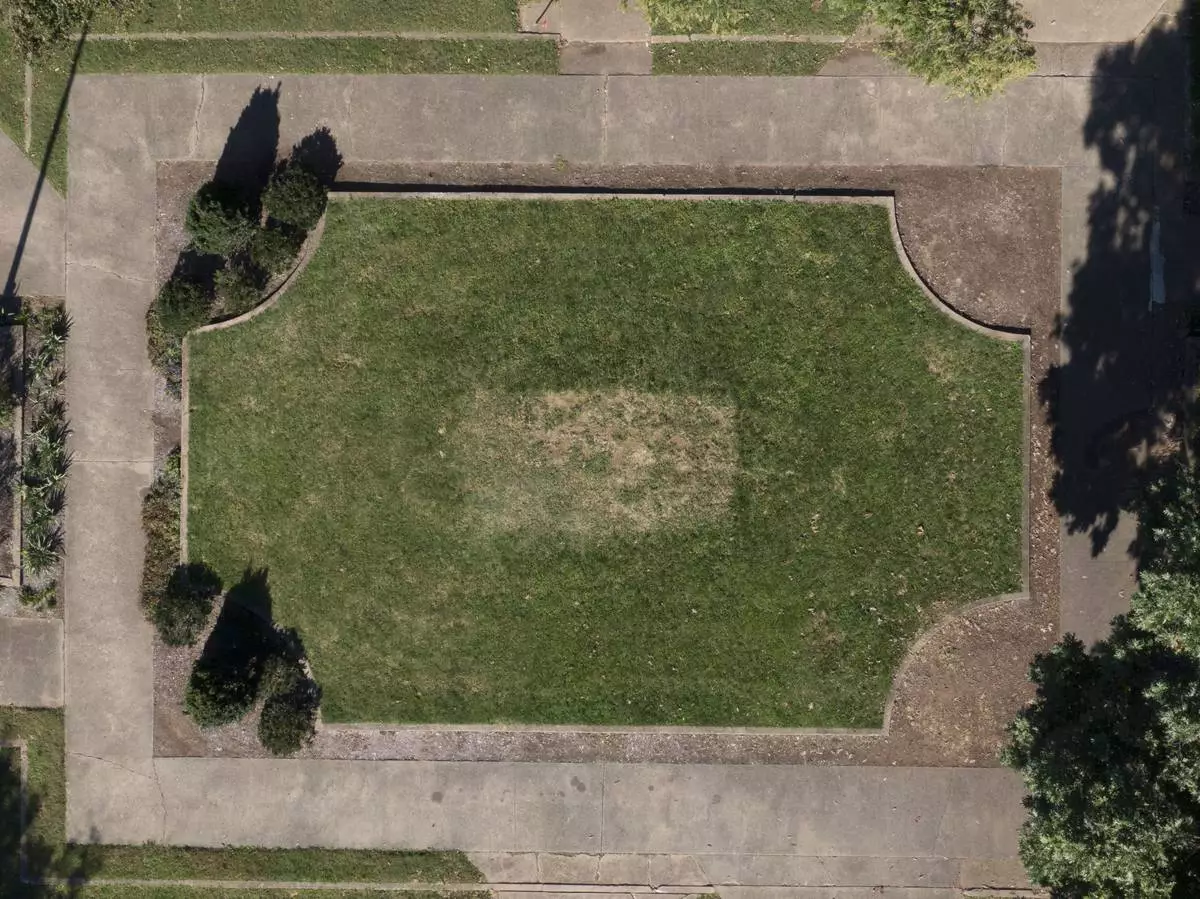
The part of the Market Street Park from where a statue of Confederate General Robert E. Lee was removed is seen in Charlottesville, Va., Oct. 10, 2024.(AP Photo/Serkan Gurbuz)
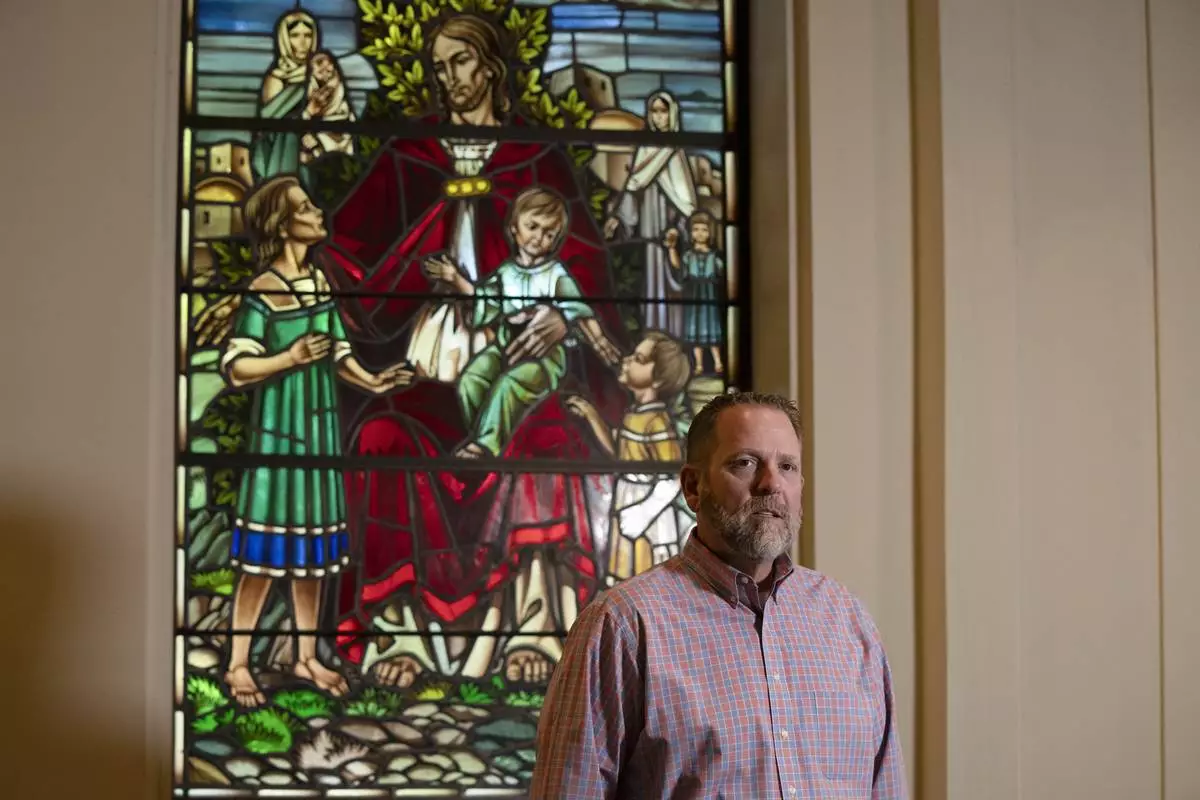
Pastor Rob Pochek of First Baptist Church poses for a portrait Oct. 10, 2024, in Charlottesville, Va. (AP Photo/Serkan Gurbuz)
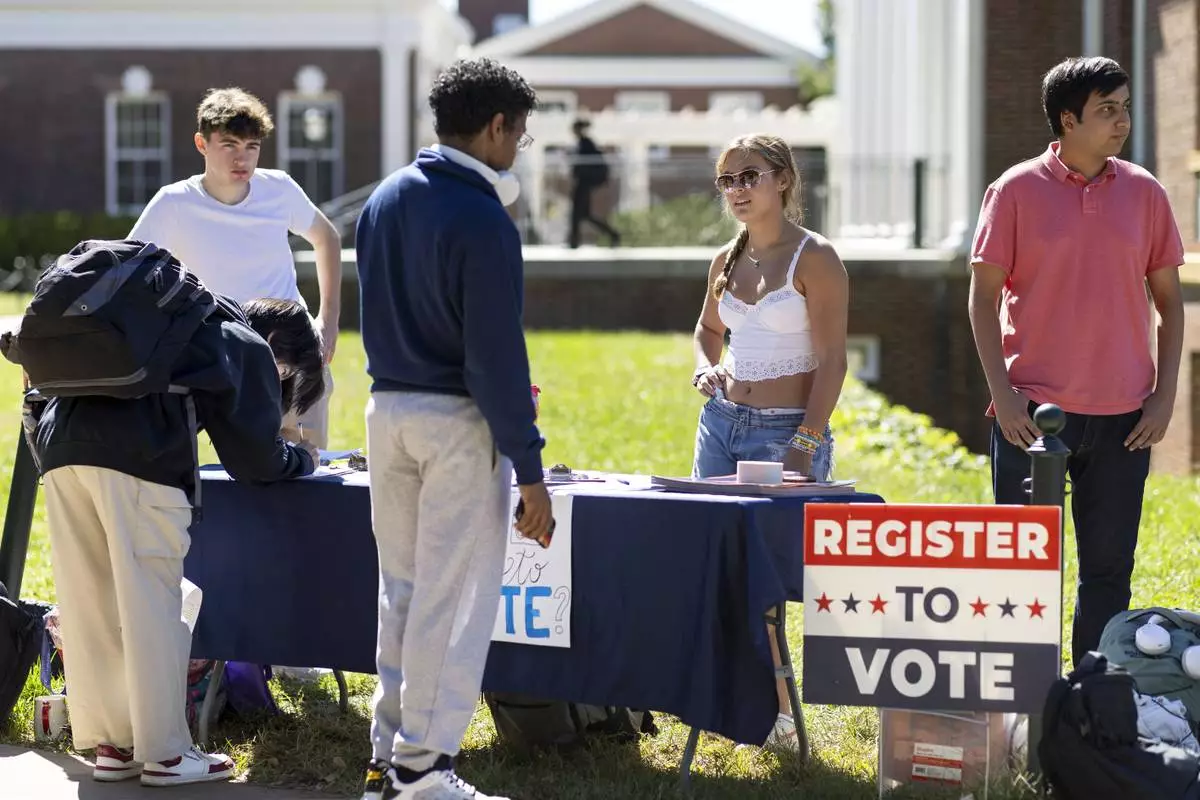
James Galvin, Charlotte Papacosma and Kushaan Soodan register students to vote at the University of Virginia in Charlottesville, Va., Friday, Oct. 11, 2024. (AP Photo/Ryan M. Kelly)
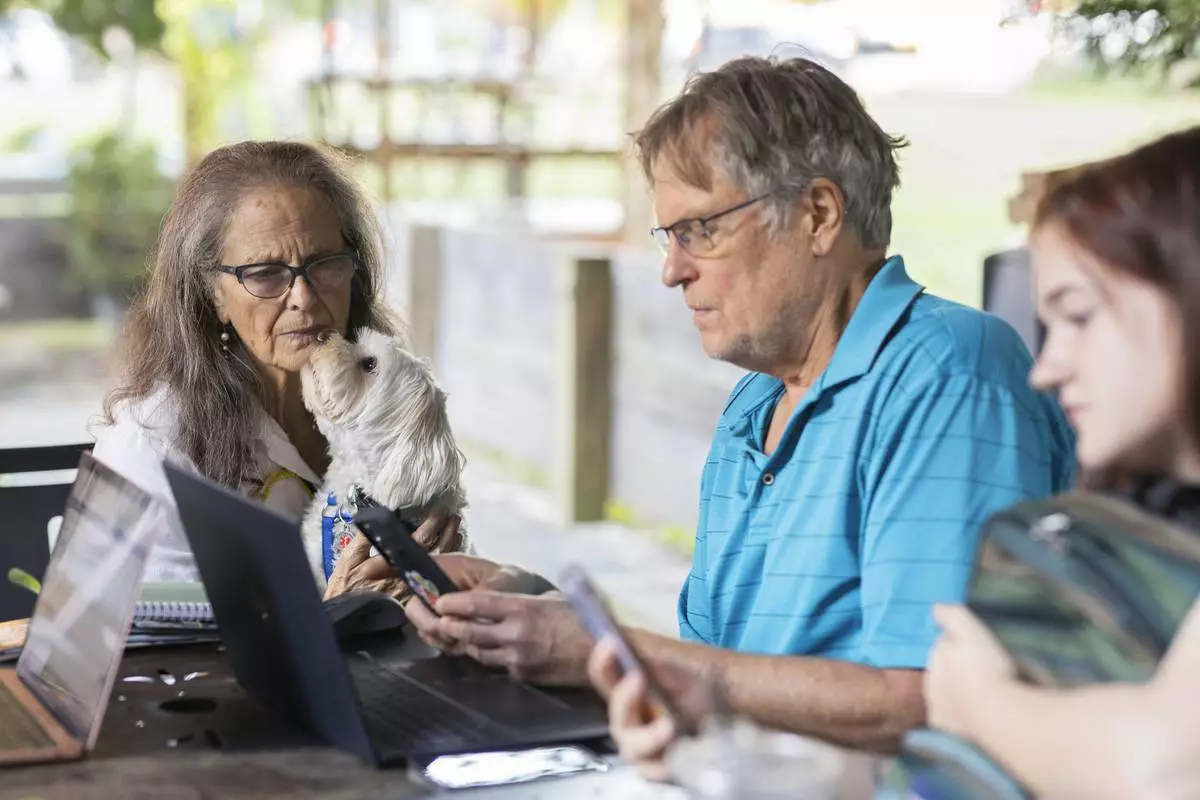
Patricia Sepulveda and Keith Fieldhammer send texts at IX Art Park in Charlottesville, Va., Thursday, Oct. 10, 2024. Charlottesville Democrats meet weekly to make phone calls, write postcards and send texts to get out the vote. (AP Photo/Ryan M. Kelly)
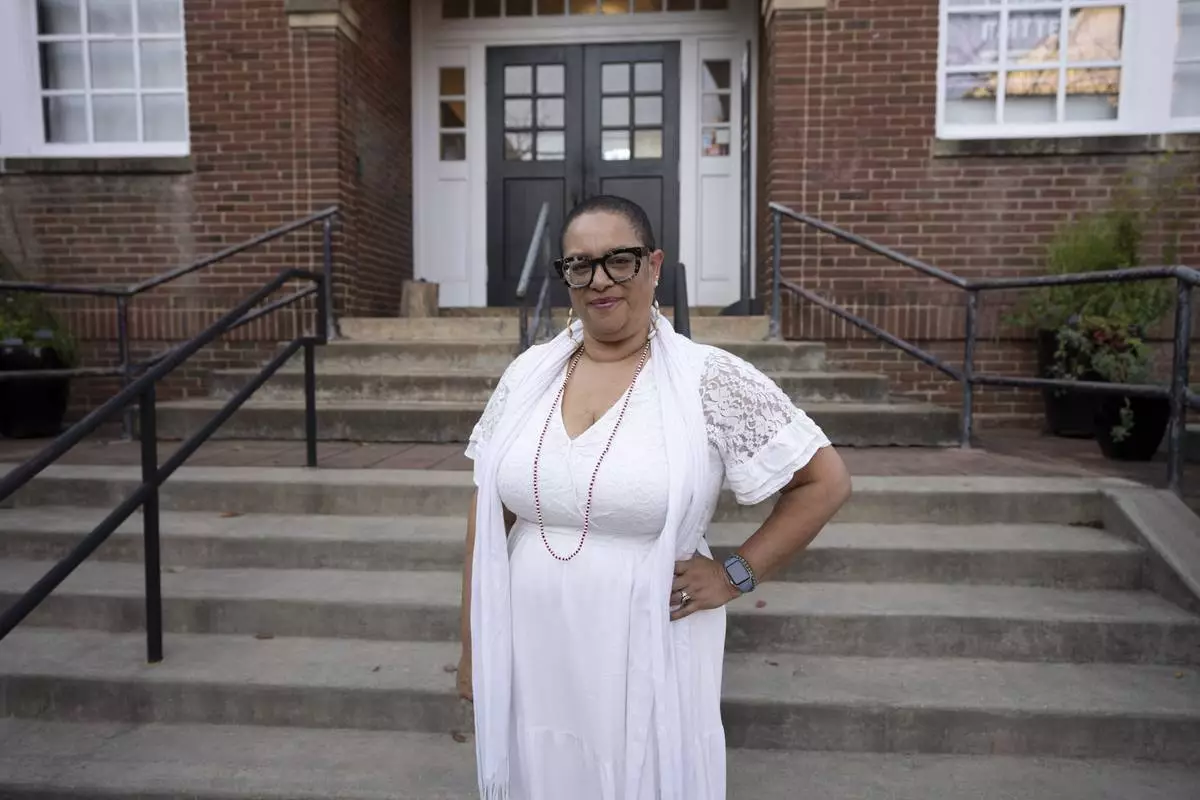
Leslie M. Scott-Jones, curator of learning and engagement at the Jefferson School African American Heritage Center, poses for a portrait on Thursday, Oct. 10, 2024, in Charlottesville, Va. (AP Photo/Serkan Gurbuz)
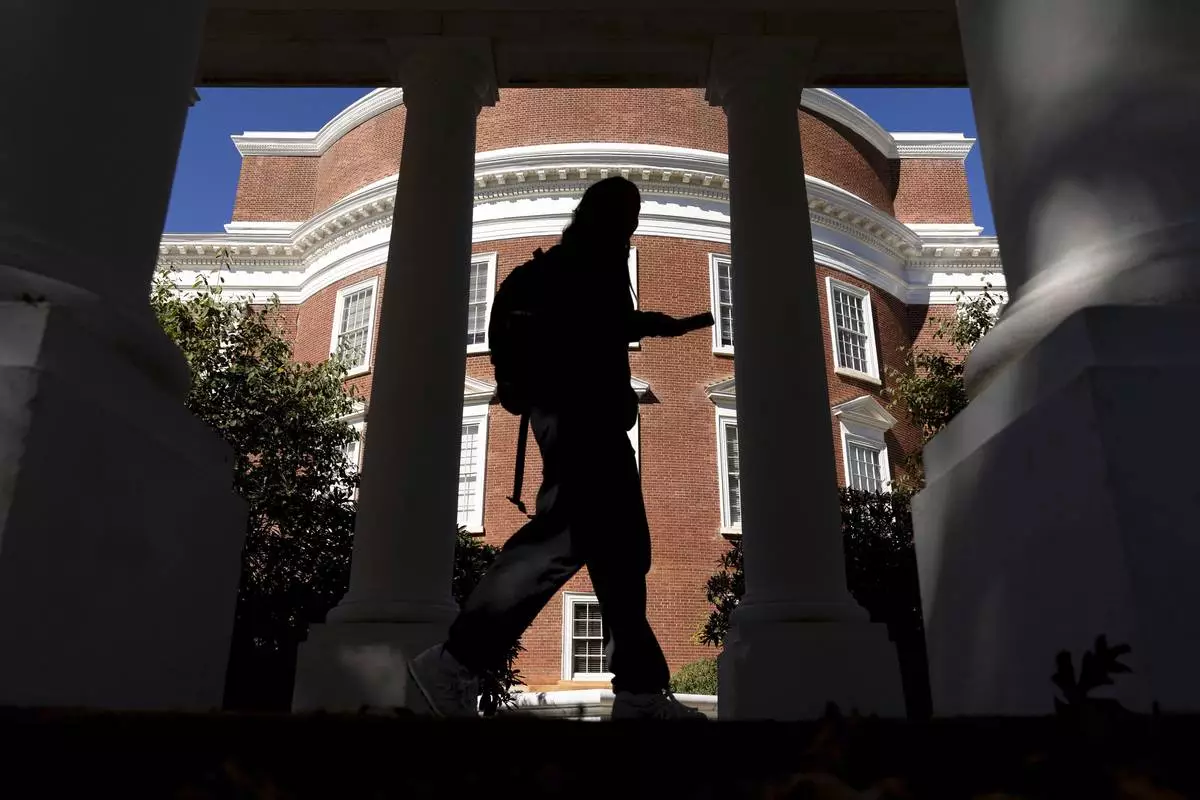
A student walks past the Rotunda at the University of Virginia in Charlottesville, Va., Friday, Oct. 11, 2024. (AP Photo/Ryan M. Kelly)
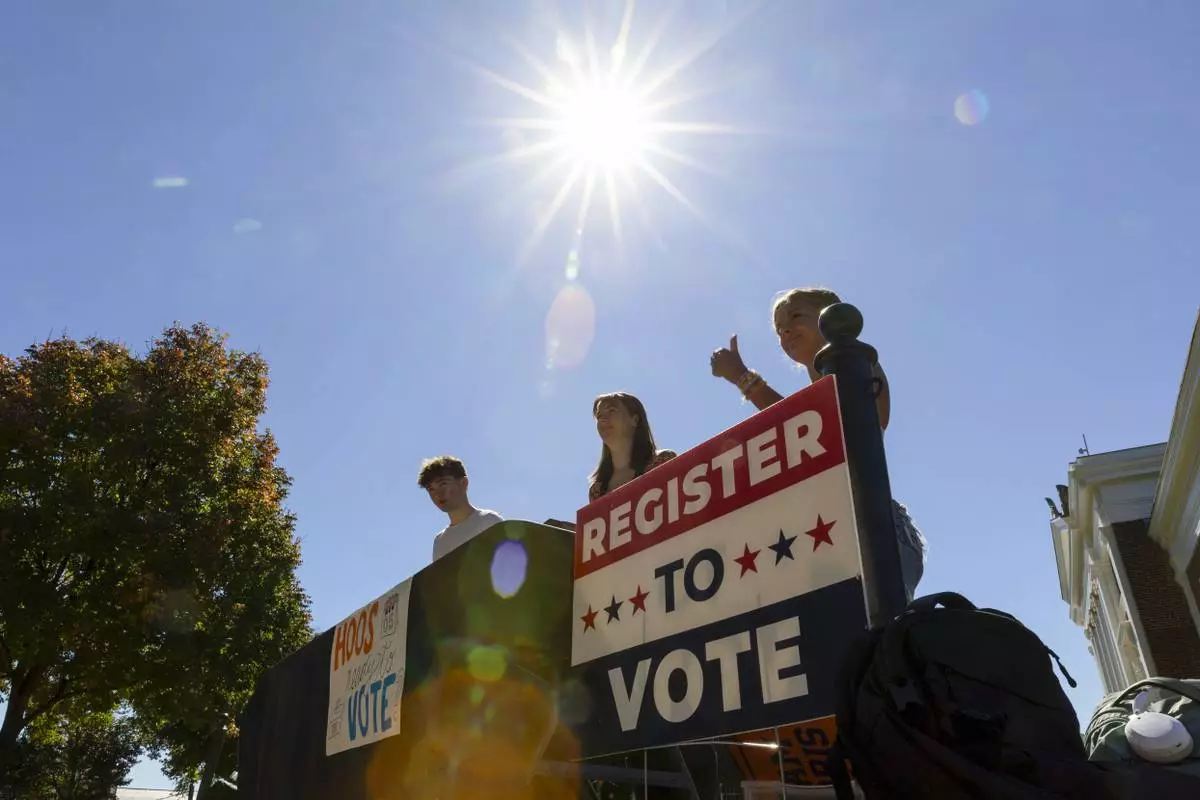
James Galvin, Ella Nelsen and Charlotte Papacosma register students to vote at the University of Virginia in Charlottesville, Va., Friday, Oct. 11, 2024. (AP Photo/Ryan M. Kelly)


